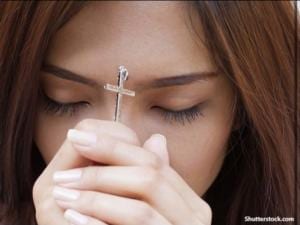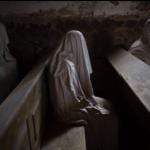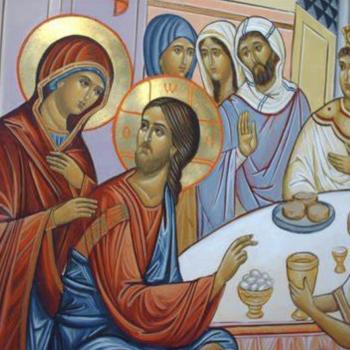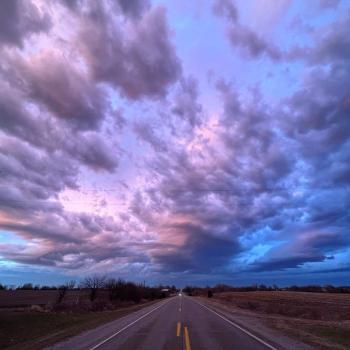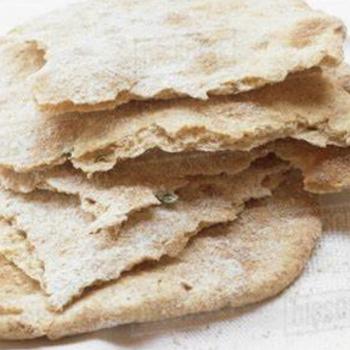I was so skinny as a teenager that the pediatrician started asking concerned questions about my relationship to food. Really I was just skinny, but she was right to ask. She said, “It’s the good ones you have to worry about. It’s the conscientious, high-performing kids who get eating disorders.”
I was a good girl. More than that, I was a good Catholic girl, the kind who strung so many holy medals onto her scapular that it jangled like a chime. I grew up into a Good Catholic Young Woman. I married quickly, had babies quickly, and published inspiring Catholic meditations, digging deeper and deeper each time to prove to myself that the system could function as a safe haven in a frightening world.
To my growing horror and alarm, though, I found myself objecting to more and more of what the Church was telling me was non-negotiable. Eventually I looked at myself and realized I didn’t match my own definition of what a “good” Catholic is. And then it was time to make a choice:
I could go ahead using that modifier, “Catholic,” and drop the “good” part. Good Catholics, after all, don’t object to certain passages in the Catechism. Good Catholics don’t secretly think to themselves that they might never go to confession again. Good Catholics definitely don’t have dissociative episodes at every single elevation of the Host–or if they do, they don’t let it rattle them, I guess?
But then, there are still icons all over my house, and Saints who have made permanent inroads in my life, and the catholic imagination is as much a part of me as my early childhood is. I don’t think it’s ever really going away. So. I could just be a “bad Catholic,” like some people are, and stay, and have somewhere–sort of–to belong.
The other option was to lose the modifier “Catholic” altogether. Which is what I chose, even though it hurt like losing my actual first name.
It’s hard to explain the visceral reaction to the label of badness that you develop after a lifetime of being good good good, at any cost. I’ve been disgusted with myself for so long, I just couldn’t imagine willingly identifying as a bad anything. I’d rather be nothing at all. Actually, it’s not about what I’d rather be–it’s about what I can live with.
Being “good” had become a kind of compulsion. You can’t ask somebody to binge and purge just a little bit, but not as much. That’s not how compulsions work; it’s way outside the realm of ordinary willpower. I’d become addicted to performative good Catholicism; I was using it as a way to distract myself from the bottomless well of shame and guilt inside of me–my pediatrician was dead on. Little girls who are too perfect might be working hard to compensate for something terrifying they feel in themselves.
Like the addict who doesn’t know how to have just one drink, I don’t know how to be a bad Catholic. I only know how to be a very, very, very good one, but that was going to kill me. So for now, it’s clear to me I can’t call myself a Catholic. I miss it. It feels like missing a limb, or a child. It wasn’t a triumphant exit, so much as a clumsy bid for some sense of peace and safety, but here I am.
And then, the inauguration happened, and suddenly all I’m hearing is this back and forth:
“Joe Biden, wow, our second-ever Catholic president!”
“Biden? No, come on, he’s not a *real* Catholic.”
And I wonder. Who’s in charge of drawing the lines in the sand? Do we have our second-ever Catholic president? Or do we have a pretend-Catholic president? A cafeteria Catholic, a dissident Catholic, an In-Name-Only Catholic, a non-practicing Catholic, a cultural Catholic.
I know it’s a little different with a public figure, maybe, but I keep getting stuck on those terms. “Cafeteria Catholic,” a person who picks a little of this, and a little of that, to suit their persnickety tastes.
Ouch.
I’ve used those terms myself, scornfully, for other people who weren’t living up to my own standards. I know how those words are meant. They mean, “You don’t belong with us.”
And now, here I am, wondering if there’s a safe place for somebody like me in the Church, and it’s hard hearing all these confident pronouncements of who doesn’t belong.
Where’s the line where a bad Catholic becomes not-a-Catholic? Who decides?
I know, I know, the Catechism is clear that being a Catholic is about being baptized as a Catholic, but while that’s technically true, it doesn’t help when it’s not how everyone around you is speaking. How many people out there are like me, wondering whether we are Catholic enough to count?
Human beings, the fascinating, social mammalians that we are, have one pressing question that drives more of our choices than we sometimes want to admit: Do I belong?
For a mammal, group belonging is survival and safety.
“Do I belong here?” means, “Am I safe here?”
I used to find safety through goodness. I used to make sure I belonged by hanging enough noisy metal around my neck that it was obvious without even looking at me that I did belong, I did, I did, I did. I was one of you! I was going to be okay! I was “in”!
I’m still seeking safety and belonging; that drive doesn’t expire. But lately, I wonder whether I could ever find safety and belonging in a community that is too ready to make it clear that only the “good” have a place.
I know a handful of brave and stubborn souls who believe the same things I do, and somehow comfortably identify as Catholic. Their church needs them just as they are, they say. They are baptized as Catholics, and the matter is closed. They don’t wait to be invited at all, if you can believe it! It’s frankly amazing to me. They just welcome themselves in, confident that they do belong, (just the way they are!) because they are not ashamed of their consciences. I’m a little jealous of this kind of strength. Maybe someday I’ll get there. For now, I am where I am. Unwilling to be a bad Catholic, unable to be a good one.
Anna O’Neil is putting everything else on hold and looking for relational, emotional, physical, and spiritual safety. She’s a little bit exhausted, but it’s good honest work. She lives in Rhode Island with her partner and three children, where she lies on the floor a lot and struggles with ambitious origami projects.

